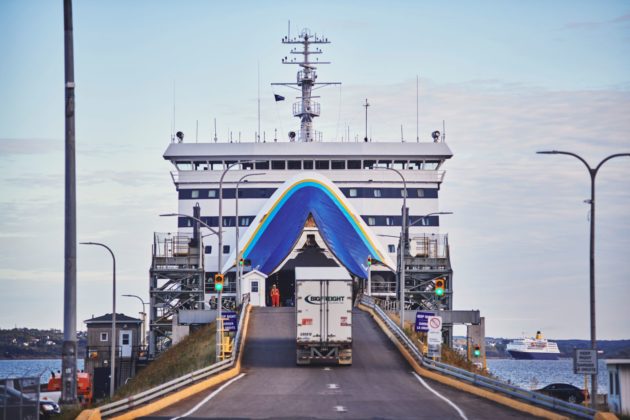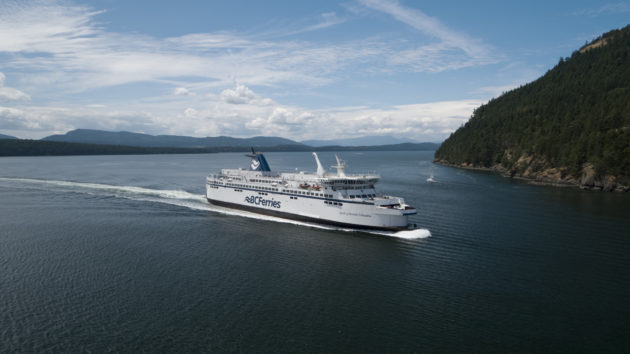Commercial ferry service maintained during Covid-19, with changes

VICTORIA, B.C. — Canada’s east- and west-coast ferry services, Marine Atlantic and BC Ferries respectively, are maintaining service during the Covid-19 outbreak, but with a few changes to operations.
Marine Atlantic has introduced passenger screening and stepped up cleaning measures while establishing isolation areas at its terminals and on board the vessels. On-board retail shops and snack bars are closed, bar service has been discontinued, and food services have been adjusted. It has also set a passenger limit of 250 customers per crossing.
“This allows Marine Atlantic to promote social distancing and establish effective isolation areas on board the vessels,” said Darrell Mercer, corporate communications officer, Marine Atlantic.
For commercial customers, the ferry service has changed the commercial berth process to help with social distancing. Drivers are now provided access to a single occupancy cabin during the crossing if they purchased a berth. The number of cabins reserved for commercial customers has been increased to 35 per crossing. Drivers will not pay any additional fees for the single accommodations, Mercer said.
Due to the unpredictable weather and sea conditions in the Cabot Strait, Marine Atlantic will not permit customers to stay in their vehicles during the crossing. According to a statement on the company’s website, “Vehicle decks are not heated and could create a challenging environment for passenger comfort and safety. Due to emission regulations, customers will not be permitted to start their engines as they are in an enclosed vehicle deck during the crossing.” As well, “there are no washroom facilities on the vehicle decks. Individuals who require the use of washrooms would need to walk through the vehicle decks and stairwells in potentially rough conditions.”
Marine Atlantic is no longer accepting “we-load” units, defined as a vehicle that requires a staff member to enter the cab of the vehicle and drive it onto the vessel. This does not include drop trailers or any other towable vehicles, noted Mercer.
To ensure the continued supply of food and medical products, Marine Atlantic has prioritized certain commercial loads for transport, including:
• Fresh fish and meats
• Perishable produce
• Medical supplies, including pharmaceuticals
• Live products
• Food (dry provisions)
• Milk and dairy products
“With our priority focused on the protection of the health and safety of customers and employees and maintaining our essential ferry link, we will continue to work with health professionals and make additional adjustments to our operational policies and procedures in the days ahead, as required,” Mercer told TruckNews.com.

BC Ferries is maintaining service to all destinations but with some schedule cutbacks due to declining traffic volumes. In line with directions provided by the Public Health Agency of Canada and other leading health authorities, BC Ferries has also made changes to its cleaning and disinfecting procedures, passenger accommodations and has closed or curtailed many onboard and terminal vending services.
As of March 25, BC Ferries has not been instructed to restrict travel. BC Ferries continues to carry all types of traffic.
“None of us should be traveling if it is not essential,” said Mark Collins, BC Ferries’ president and CEO. “We want our customers that need to travel to know that we have taken steps to keep ferry travel as safe as possible. We are asking our customers to adhere to safe practices for their own safety and for the safety of BC Ferries employees.”
Enhanced health and safety measures taken by BC Ferries include additional cleaning and disinfecting, allowing and recommending passengers to remain in their vehicles on most decks, closure of the overhead walkways so walk-on passengers can have the space to practice social and physical distancing from other passengers, the closing of food and retail services, suspending baggage handling and requiring customers to use an electronic form of payment (debit or credit card or Experience Card).
BC Ferries has also put measures in place to separate employees from customers when they do need to interact, such as at the ticket booths.
“Our front-line co-workers face the COVID-19 virus everyday so that critical supplies like groceries and medical supplies, and people reach coastal communities,” said Collins “We are incredibly proud of our loyal and dedicated colleagues.”
Have your say
This is a moderated forum. Comments will no longer be published unless they are accompanied by a first and last name and a verifiable email address. (Today's Trucking will not publish or share the email address.) Profane language and content deemed to be libelous, racist, or threatening in nature will not be published under any circumstances.